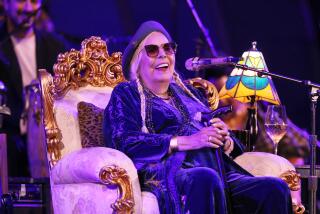Massive Attack’s involving presence
- Share via
An odd thing happened with the third song of Massive Attack’s concert at the Hollywood Bowl on Sunday. None of the people performing at that point were actually members of Massive Attack.
With Elizabeth Fraser, formerly of the Cocteau Twins, coming on stage to sing “Black Melt” (and quite beautifully at that), the only actual Massive Attacker on the current tour, Robert Del Naja, sat on the front of the drum riser and, well, sat.
Fraser was then backed by just five supporting musicians, as was Horace Andy on the next song, “Man Next Door.” In fact, for about half the show, Del Naja -- whose partner, Daddy G, is back in England on paternity leave -- had no active role, as Fraser, Andy and/or Deborah Miller handled the vocals. (Fraser and Jamaican-born Andy are veteran Massive cohorts, while Miller is a new find.)
On paper it might sound perilously like “The Massive Attack Revue.”
On stage it was a remarkably dynamic and involving 100 minutes that truly lived up to the creative standards that have been associated with the name Massive Attack.
Since emerging in the mid-’90s, M.A. pretty much has rewritten the rules as to what exactly a band is, the studio denizens enlisting various singers to craft emotionally rich, aurally seductive tracks. Along with fellow Bristol lights Portishead and Tricky, collectively lumped as leaders of the misnamed “trip-hop” movement, they reinvented pop forms without adhering blindly to the techno conventions that dominated their environs. The best Massive recordings remain breathtakingly inventive.
So now, with a full-band tour, Massive is taking on concert conventions, and once again rewriting the rules. At times Sunday’s performance called to mind such super-achievers as Radiohead and Peter Gabriel and a few other top names of art-pop -- the opening “False Flags” fell just a David Gilmour guitar solo shy of sounding like a great lost Pink Floyd epic, yet never seemed derivative.
It was a perfect transition from the second-billed set by Brooklyn’s TV on the Radio, the acclaimed, accomplished quintet that with two albums now has refined a sound that filters its own art-rock influences (notably David Bowie circa “Heroes” and the earthier side of Sonic Youth) through an intriguing blues-based reduction. The problem with the group is a sense of coldness that radiates from the music, though less so Sunday at the Bowl than on recordings, in large part due to singer Tunde Adebimpe’s personable ways.
There’s nothing wrong with an anti-pop stance, but would it kill these guys to write a memorable chorus? It’s not like they’re playing free jazz or Persian taqsims or anything so far off the mainstream map. That lack (as well as being cut off at the start of what was to be the final song of the set due to the Bowl’s tight timetable, just as a real sense of momentum was being built) undermined the still-interesting performance, spiked by well-woven lyrics blurring the lines between personal and political passions.
No such problem for Massive Attack. While the lyrics are generally impressionistic, Times Square-like message light scrolls were used pointedly to add sociopolitical layers, such as the statistics of Iraq war casualties and costs that ran by as Miller and Del Naja sang the simmering-yet-hopeful climax “Safe From Harm.”
But the impact came from the whole package. When out front, Del Naja danced and shadowboxed between lines sung with his sharp-edged voice, a spotlight-worthy frontman -- that is, if there had been a spotlight. The stage was lighted almost entirely by a bright bank of color-shifting lights behind the performers, leaving them in semianonymous silhouette. The band brought full life to the music without ever merely copying the recorded versions. The intro-to-launch build-up of “Angel” seemed ready to break free of gravity itself. Beats were somehow at once fluid and rock solid, tones ranged seamlessly from delicate and brittle to powerfully, uh, massive.
More to Read
The biggest entertainment stories
Get our big stories about Hollywood, film, television, music, arts, culture and more right in your inbox as soon as they publish.
You may occasionally receive promotional content from the Los Angeles Times.










